
When site and store owners dig into server options, they usually run into one of two scenarios: dishing out big bucks to buy all the gear they need or settling for less-than-perfect solutions because the cost of getting top-notch stuff is sky-high. For many, it’s a choice between burning a hole in their pocket or compromising on what they really need.
Enter colocation hosting, a middle ground where it’s possible to get the same support and tech that big businesses enjoy by renting space on a beefy server rack and slapping your server hardware on it. If that sounds intriguing, there’s more good news coming your way as we take a look at the best colocation hosting providers.
1. Liquid Web
From its privately owned facilities in the United States, Liquid Web offers data center colocation services well-supplied with security, power, and network features for a premium experience. We’re talking tier-1 bandwidth providers, offsite backup and premium disaster recovery services, HIPAA-compliant hosting, multiple 10 GB fiber links between data centers, and much more.
Liquid Web
- Highly secure data centers with N+1 redundancy on all networks, hardware, and systems
- Redundant fiber entry points and multiple 10GB fiber links between data centers
- Fully redundant Cisco ASR and Nexus 9000 series network core
- Get started now »
COLOCATION
RATING
Note: This pricing reflects the starting monthly price of dedicated hosting. Contact Liquid Web’s sales department for colocation pricing, as availability varies.
Having built its facilities with multitiered redundancy, Liquid Web guarantees 100% network availability in a given month. While server configuration and any kind of software handling aren’t part of the colocation package, the web hosting provider offers hands-on support as an add-on should you need remote assistance.
2. InterServer
With a data center located in Secaucus, New Jersey, InterServer offers four packages of colocation hosting, as well as a custom configuration. On-site 24/7 Linux and Windows support is available for hard drive replacements, OS installations and troubleshooting, network configurations, and everything else is performed at an hourly rate.
InterServer
- TEB2 and TEB4 data center in New Jersey with 24/7 support from Linux and Windows experts
- Fast and friendly service with fast reboots, console checks, and KVM plug-ins
- Full-size locking cabinets (42u and 48u) available without long-term commitment
- Get started now »
COLOCATION
RATING
You get to enjoy the convenience of reboots and console checks at no additional cost. Free stuff extends to the initial racking and stacking of new equipment delivered to the colocation data center, with full-size 42u and 48u locking cabinets obtainable for purchase. To top it off, you can use the service as you go without any commitments or long-term contracts.
3. Equinix
A worldwide network of 250 data centers located in 71 major metropolitan areas makes Equinix one of the best colocation hosting providers to deploy infrastructure in proximity to your customers and partners. To smooth the process, an on-site support team for remote management, installation, and troubleshooting of your data center equipment is available around the clock.
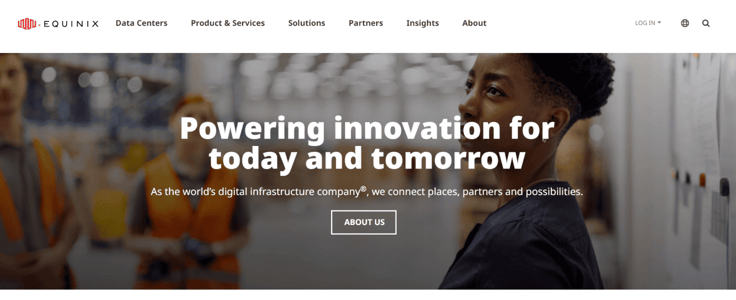
A wide array of cages and cabinets to effortlessly accommodate your equipment size, power, and cooling requirements are available, but you can also purchase a non-cage space for offices or storage. The company offers a number of colocation-related services as well, such as routine preventive maintenance to minimize equipment failures or shutdowns.
4. Cyxtera
Specializing in cloud-like colocation, Cyxtera offers a full suite of power, space, interconnection, bare metal, and remote management solutions. Users can tailor their setup to precisely match the needs of their business, starting with single-tenant colocation cabinets all the way to a complete turnkey environment supported by flexible pricing plans.
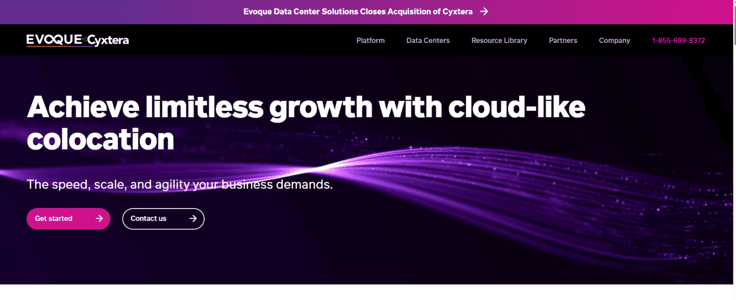
You get access through a central dashboard where you can choose on-demand provisioning and customize each data center element. As an add-on, Cyxtera offers on-demand Remote Hands support. A technical expert team on call 24/7 will perform routine services scheduled in advance or, if needed, respond to urgent or unexpected matters.
5. Iron Mountain
Whether you seek an ultra-secure underground colocation facility, a custom hyperscale data center, or an enterprise-ready one, Iron Mountain delivers personalized and fully serviced colocation packages stemming from three decades of experience. Plus, the colocation provider operates a global platform with locations in Europe, Asia, and North America.

Offerings go beyond physical spaces, as Iron Mountain also provides a spectrum of certified monitoring, migration, and engineering services. Some of these include detailed NOC reporting, comprehensive builds and migrations, carrier-neutral networking, and data center interconnect services on a one-off, ongoing, or international basis.
6. Digital Realty
A variety of configurations means Digital Realty checks virtually all the boxes, from fully customized build-to-suit data centers to a colocation solution optimized for high-performance computing workloads. Each of the 300+ sites across four continents includes redundant power and cooling designs, advanced physical security features and controls, as well as variable power densities and floor loads, to name a few.
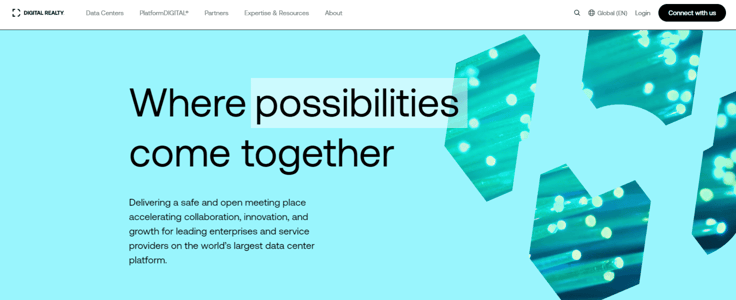
When it comes to specifics, at your disposal are cabinets up to 52U and cages starting at 100 square feet, along with modifiable private suites and redundant configurations from N+1 to 2N+1. Remote hands services are available at all sites, while you can also opt for scheduled and on-demand services should the need arise.
7. CoreSite
CoreSite has you covered with small-scale deployment, a secured portion of a data center, and any type of specific or complex requirement. You can connect directly to every major cloud provider, including Amazon, Microsoft, Google, Alibaba Cloud, Oracle, and IBM on-site. To make the transition seamless, CoreSite lends a helping hand with coordinating and implementing every deployment and installation.
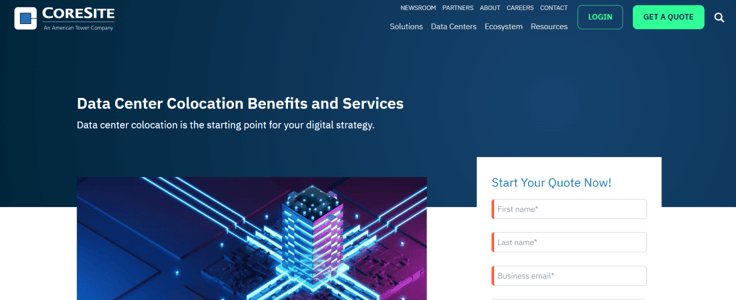
Special attention is paid to security measures, which include 24/7/365 in-house security officers, perimeter fencing, mantrap entries, IP-DVR cameras, biometrics, and keycard scanners. As a neat bonus, you can use CoreSite’s Data Center Total Cost Calculator to check how much colocation can save you.
8. Flexential
Thanks to a versatile colocation service mix, Flexential grants you the full freedom of deployment design and connectivity options. The setup of your choice can be powered up to 1,500+ watts per square foot, making it perfect for high-density applications. With cloud connectivity to Oracle, Azure, AWS, and Google Cloud, as well as hundreds of carriers and international markets through subsea cables, you can access, store, and manage your data wherever you want.
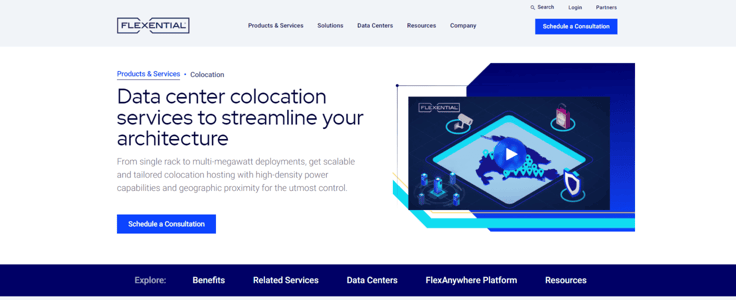
The FlexAnywhere platform is where you’ll operate, complete with automation, third-party and API integrations, and scalability for your business growth. Flexential’s staff will be at your side every step of the way. They can create future-ready designs for your IT infrastructure, build and maintain effective disaster recovery, and form cloud strategies for optimal workload placement, among other assists.
9. Rackspace
Available in select data centers across North America, Europe, and Asia, Rackspace offers colocation with multiple layers of redundancy, reserved capacity, and multilevel physical and network security protocols. It does this with cross-connects for direct access to the public cloud, private cloud, third-party data centers, or the Rackspace managed hosting environment.
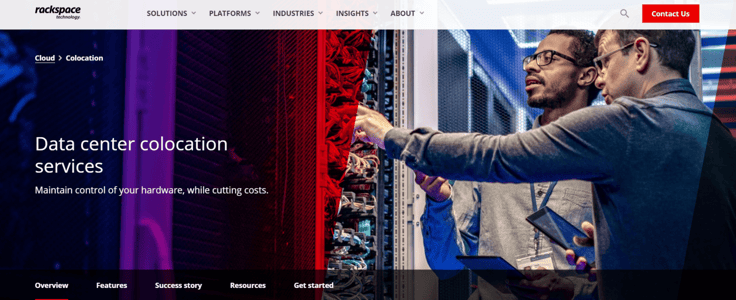
Via RackConnect Global, you can access hyperscale public clouds, Equinix Cloud Exchange, Megaport, and hundreds of network carriers, as well as create a virtual private network for more security. Rackspace offers some of the industry’s best SLAs and guarantees, with 100% network uptime, HVAC, and power being the standouts.
10. CyrusOne
Colocation cages by CyrusOne are “build-to-suit,” which means they are designed to provide organizations of all sizes with the flexibility to grow within a secured space while avoiding the hassles of operating their own data centers. The data center developer and operator also has carriers and cloud on-ramps for allotment in case you want to connect your multicloud environment with dedicated low-latency connections.
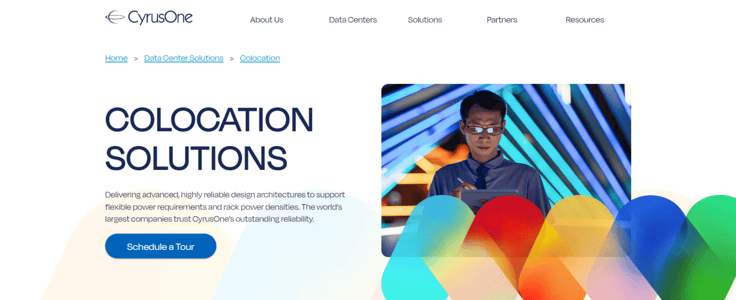
CyrusOne has colocation server offerings in partnership with HPE GreenLake cloud service, combining the benefits of a cloud experience while letting customers keep full control of their IT with the advantages of a colocation server. Enterprises can also choose numerous services for their workloads in just a few clicks, pay per use, scale up and down as needed, and get a managed service as well.
11. NTT Global Data Centers
Guided by industry best practices, NTT Global Data Centers uses a modular construction and design approach for its colocation hosting services and products. You’ll have no problem finding a fit for your business: turnkey cabinet colocation solutions, custom cages, dedicated vaults, and powered shell and build-to-suit data centers are all up for grabs.
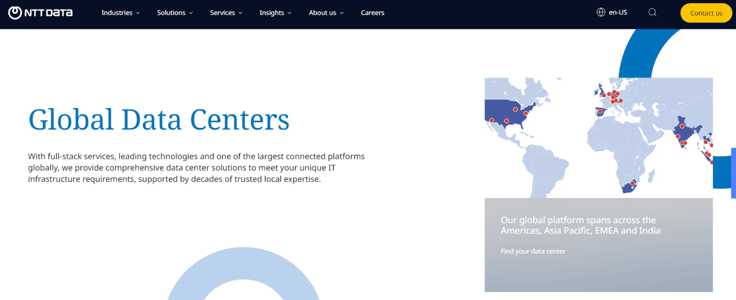
The colocation provider has one of the largest connected platforms globally, bolstering more than 190 countries with network, cloud service, and data center services coverage. Trained experts will make your move-in easy, and there’s 24/7 on-site coverage of all the facilities, operations, security, and engineering groups.
12. DataBank
There is no shortage of options with DataBank, as you can select between a broad range of cabinet, cage, or suite designs, HPC-ready builds, and fully SOC-2-certified micro-data centers for powering low-latency and geo-specific edge applications. From there on, you can customize the power, security, and layout of your colocation space.

Each data center offers shared and dedicated office space, lunch and learn rooms, and multiple conference rooms, with available hand tools, crash carts, server lifts, and cabling supplies for both short- and long-term storage options. DataBank provides hands-on assistance in migrating or transitioning your applications and services back from a cloud environment.
What Is Colocation Hosting?
Arguably, the best way to describe colocation hosting is to compare it to renting a secure and high-tech place for your servers and other computing hardware instead of keeping it in your offices, warehouse, or wherever.
It’s very much like having a dedicated space in a well-equipped data center or other specialized facility designed for web hosting, where you place your hardware, and the data center provides the essential power, cooling, networking, and security services.
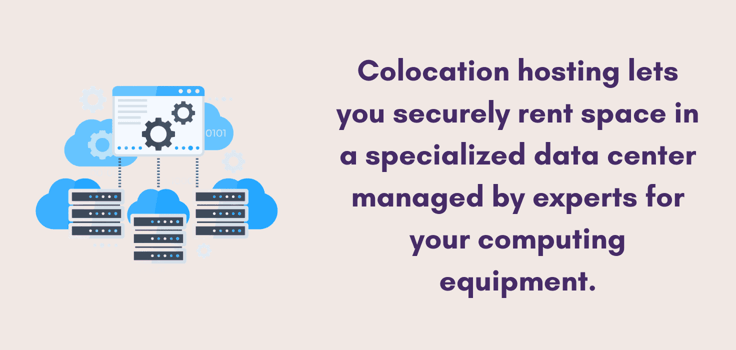
In doing so, colocation hosting allows you to offload the management of physical infrastructure to the experts at the data center while you focus on your core business operations. Thus, you get to save time and money by having someone else power and maintain your infrastructure for you.
What Is an Example of Colocation Hosting?
Let’s say you have an eCommerce store trying to meet a growing demand. To ensure seamless operations, the logical move would be to upgrade your server infrastructure. But your existing on-premise setup may lack the capacity and reliability to support the increased traffic and data processing requirements.
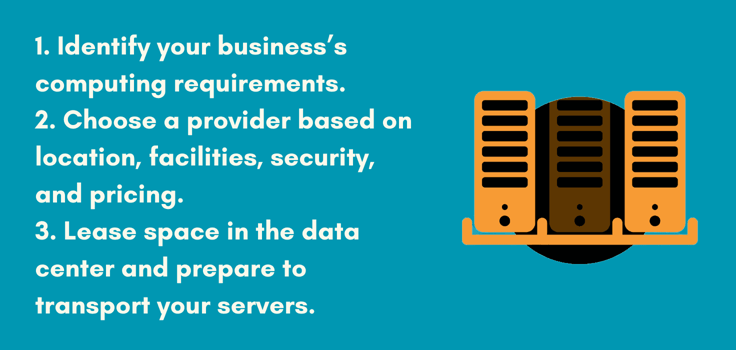
This is where colocation hosting comes into play. You can lease space from one of the colocation providers and transport your, say, Linux dedicated server, to the data center’s secure and climate-controlled environment.
Then, the team there assumes the responsibility of providing everything required for smooth operation: uninterrupted power, cooling systems, high-speed network connectivity, and security measures. All the while, you retain full ownership and control over your hardware and data.
Is Colocation Cheaper Than Cloud Hosting?
If your website or application doesn’t use a lot of resources, cloud hosting will likely be the more affordable option. This is because you typically only pay for the resources you consume (unlike VPS hosting), so your monthly bill will depend on the amount of traffic you receive.
The other thing is the upfront cost of colocation hosting services, which may be too much for a small business. The majority of data center colocation providers require a minimum amount of space clients need to lease, a fee may be involved based on the services included.
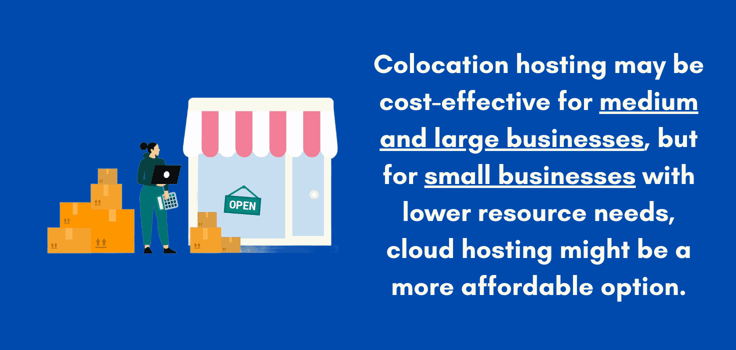
You also have to factor in other expenses like travel costs for your team in the event that they need to manually access your hardware. Hence, a small business running only a couple of machines could spend more on server colocation than it could save.
Colocation hosting is appealing to medium and large businesses because it eliminates the capital expenditures of building and maintaining one’s facility. By outsourcing the hands-on management to the data center, the company can save on expenses associated with power, cooling, and security, particularly for high-end servers.
How Much Does Colocation Cost Per Month?
It’s difficult to provide an approximate number simply because the majority of colocation companies don’t publicly show their pricing but rather provide quotes on requests. These are based on the unique needs of every organization, like rack and cabinet costs, power and cooling requirements, bandwidth and connectivity options, support and maintenance fees, and additional costs, so prices will vary significantly.

That being said, expect to pay anywhere from $100 to $300 per U (unit) per month (similar to what you’d pay for dedicated server hosting). For instance, InterServer has a 1U plan that costs $99 per month and includes 150 TB of transfer, 1 GB port, and 5 IP addresses.
Does Rackspace Offer Colocation?
Yes. The San Antonio-based company runs more than 20 secure colocation data centers available in North America, Europe, the Middle East, Africa, and Asia Pacific (not South America, though). You handle the management side of your hardware, with the option of Smart Hands as a complimentary service that provides access to a highly trained team of technicians and engineers available 24/7/365 for routine physical tasks.
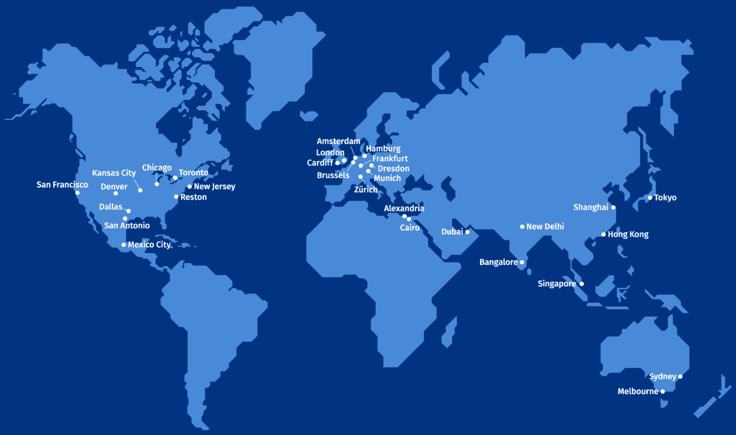
Rackspace uses an allocated billing model for its colocation service, which charges by kilowatt (kW) for the right to use a defined amount of reserved redundant critical power. There is no additional charge for space or cooling, though you pay for one-time installation fees, power circuits, private cages, in-rack PDUs, and cross-connects. You also pay monthly recurring fees for cross-connects and blended bandwidth if you opt for them.
Book a Five-Star Hotel for Your Servers
For businesses seeking a safe haven for their IT infrastructure, colocation hosting represents the optimal balance between spending a fortune on dedicated server hosting and pinching pennies on shared hosting.
There’s more than meets the eye here, as it’s a game changer for reliability and speed. A colocation space is often strategically located near major internet exchange points, making sure your data takes the expressway to any domain name worldwide.
Look at colocation hosting as a strategic partnership between you and one of the reputable data center colocation providers that offers security, scalability, and high-speed network connectivity. In other words, all you need in a hosting service for a flourishing online presence.
HostingAdvice.com is a free online resource that offers valuable content and comparison services to users. To keep this resource 100% free, we receive compensation from many of the offers listed on the site. Along with key review factors, this compensation may impact how and where products appear across the site (including, for example, the order in which they appear). HostingAdvice.com does not include the entire universe of available offers. Editorial opinions expressed on the site are strictly our own and are not provided, endorsed, or approved by advertisers.
Our site is committed to publishing independent, accurate content guided by strict editorial guidelines. Before articles and reviews are published on our site, they undergo a thorough review process performed by a team of independent editors and subject-matter experts to ensure the content’s accuracy, timeliness, and impartiality. Our editorial team is separate and independent of our site’s advertisers, and the opinions they express on our site are their own. To read more about our team members and their editorial backgrounds, please visit our site’s About page.









